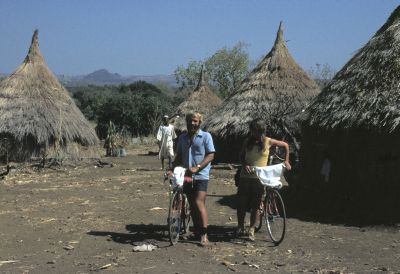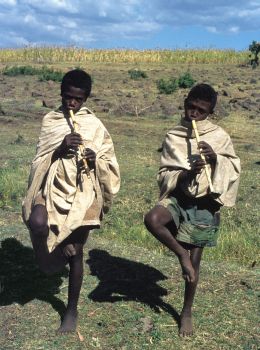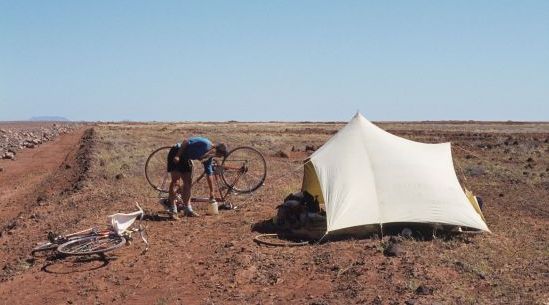| home | site map | world | children | recent | cooking | dutch | german | react | ||||||||||||
Eastern and Southern-Africa 1 (1972).

Sudan: Very courteous, friendly and hospitable people
S
udanese are black, muslim, Arabic speaking people and were the kindest, most courteous and helpful people we ever met. They invited us to the festival of Id-al-Fitr, the end of the Ramadan, the muslim fast. Sitting on their carpet we joined their "breakfast" (literally: breaking the fast) of ram in a spicy sauce.Sudan has no roads, only tracks through the desert. We stuck to the Nile and found enough villages to stop at night. During daytime, cycling through a heat of over 110° F, the few trucks who made up the whole traffic, always stopped and asked us if we needed water. There was little vegetation and what managed to exist protected its tiny leaves with long thorns. These were plentiful hidden in the sand and about 20 punctures daily were normal, the record was set on 34 in one day.

Ethiopia: For some reason the pastors here thought it comfortable to play their flute while standing on one leg.
While repairing a flat tyre, we got visitors from a local tribe. Their outfit was very original: loincloth, many beadstrings and the inseparable spear. Modern times were manifested only in plastic wires in their ears and made them look like sputniks. We took a picture, they wanted money; that was know too. We never do, so refused. Knifes were threatingly pulled out, but a deal was soon made: a box of matches.
In Ethiopia we found one of the poorest people we ever met. In the villages we could not buy any food, which never happened before, so we suffered hunger for two days, before we reached a town, not being used to buy and carry food for several days with us. Since then we carried always enough supplies of food, even if our map showed some little towns on the way. Still we had a lack: water. When we asked for it, people showed us a dirty pool or a brownish stream at the best within one mile. No wonder they don't wash their clothes too often and we learned to take a bath at night with one pint of water.

Kenia: No shade in the redstone desert, so we had to create it"
More desert waited us in the North of Kenia, about 300 miles and the map showed only 3 tiny dots with a name. Roads still unpaved of course, so it meant a week of riding.
| Site map (nl) | Around the world | Previous | Next page | |||